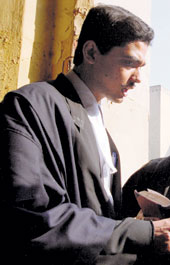 |
| HARD TIMES: Junior lawyers find themselves doing the legwork in most cases as their seniors deal with the critical aspects |
As a junior lawyer, life was tough,” says Justice Manjula Bose, sitting at her large oak desk in an anteroom of her residence-cum-chamber in Calcutta, sipping tea and recalling her initial days at the Calcutta High Court in the mid 1950s. “It was bad enough that few clients at the time entrusted women with their cases. On top of that, being new to the profession meant that you still hadn’t built up a reputation that would bring clients to your doorstep.”
Even being the chief minister’s sister didn’t help. Explains Bose, who is former West Bengal chief minister Siddhartha Shankar Roy’s younger sister: “My brother, who was a barrister himself, was aware of how juniors had to struggle before they could make it big in the profession. And he wanted to make sure that I went through the same rigorous process and not take advantage of either my family background or connections.” And though Bose ? who went on to become the first woman judge of the Calcutta High Court along with Padma Khastogir ? says she was fortunate to work under such “formidable” seniors as Subimol Roy (Dr Bidhan Chandra Roy’s nephew) and Somnath Chatterjee (now Lok Sabha Speaker), she says that “ultimately, it’s sheer hard work and grit” that help a junior lawyer get noticed.
And if today’s lawyers are to be believed, things haven’t changed all that much since the days when Bose was a junior. “A young lawyer finds it extremely difficult to get assignments,” says practising Calcutta High Court lawyer Arnab Ghosh. He says: “The struggle for a junior lawyer, who is interested in litigation, begins soon after he passes the five-year LLB exam and registers himself in a state-run Bar Council.” This is because, says Ghosh, “he is suddenly in a position where he has to find himself a senior and that is not as simple as it sounds.” The biggest challenge in the beginning, Ghosh explains, is to find a senior who is willing to work with you. “Unless you have contacts, this could be tough,” he warns.
Mumbai-based property lawyer Rajendra Abhyankar agrees. “This is a time when nobody believes you.” And just finding a senior lawyer doesn’t solve your problem. “It is only if the senior lawyers approve of your manner of handling things that they will pass on cases to you. And that too the ones they wouldn’t want to handle,” Abhyankar adds.
Abhyankar, who became a member of the Bar Council of Maharashtra and Goa in 1983 and worked under a senior for two to three years, found that his “first interaction with the judge” was “almost six months into his practice. And even then, the judges bully and push you around.” Ashwin Shankar, partner, George Rebello and Associates, Mumbai, also feels that for a junior, work is hard to come by. “As a junior, no one places trust and confidence in you. Seniority is rated above ability,” he says ruefully.
Things were no different in the case of Diviya Kapur, who started her practice in New Delhi in 1994. “The initial experience,” according to Kapur, “was frustrating.”
One of the major issues they confront, junior lawyers across the country unanimously agree, is the pay scale. “It is very low,” says Shankar. Ghosh points out: “If you get a job at a corporate company, you might earn anything between Rs 25,000 and Rs 30,000 a month even if you’re working at a junior level. But if you have decided to work in a court, you have no steady monthly income. Your senior might make you work (run around, gather notes and details about certain cases) for almost no pay (which could even be as little as Rs 200 a month and sometimes not even that). You can feel exploited and there is little you can do about it if you want to stick to the profession.”
But things improve steadily if a junior lawyer is able to survive the initial period. Delhi-based senior advocate Ashok Agarwal feels that “freshers need to rough it out for at least 10 years before they can find ground beneath their feet.” Which, apparently, most of them do. Explains Agarwal: “There are too many lawyers around for one of them to make a mark, and the law is more complicated than it was a couple of decades ago. It takes a lot of competence on one’s part to stay in the race these days.”
As Mumbai-based criminal lawyer Augustine points out: “In the early days, the challenge lies in getting clients. One has to also work hard and learn how the courts function. In the process, a junior also ends up doing work that normally a clerk or a peon would do. Having said that, if one is intelligent enough to understand things, not to mention being lucky, one can do well.”
Additional reporting by Reena Martins in Mumbai and Anirban Das Mahapatra in New Delhi










